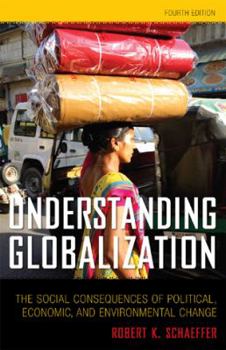Understanding Globalization: The Social Consequences of Political, Economic, and Environmental Change
Select Format
Select Condition 
Book Overview
Understanding Globalization introduces students to the concept of globalization, providing an essential history, overview of key themes and theories, and a wealth of engaging examples. The fifth... This description may be from another edition of this product.
Format:Hardcover
Language:English
ISBN:0742561798
ISBN13:9780742561793
Release Date:March 2009
Publisher:Rowman & Littlefield Publishers
Length:336 Pages
Customer Reviews
2 ratings
A very good introduction!
Published by Thriftbooks.com User , 19 years ago
Having difficulty in comprehending what exactly is meant by globalization, I readily purchased several books with somewhat forgiving titles: understanding globalization, taming globalization, rethinking globalization, globalization: an introduction, etc, etc. Be warned: the titles in no way capture the essence of the work! Some are extremely dense and difficult to understand (while claiming to be an enjoyable/readable introduction), while others are much more readable-and eminently enjoyable. Overall I purchased about 15 texts (I have numerous listed for summer reading), and have ranked each in order, from what to begin with and what to finish with; naturally, the most basic and easy text is first to be read, and then the 2nd most easy, etc. The two most easy to understand, and which-combined-provide a solid foundation are the texts authored by Tom Friedman and Robert K. Schaeffer. Next I will head to Bill Grover's "One World..." One problem with Friedman's analysis is that he focuses almost solely on economic globalization and basically never admonishes the cons-he simply says that developing countries need to understand, accept, embrace it--and get over it-or be left behind. Thus I headed to Shaeffer's book in order to get a "more" balanced picture--I don't want to only read the cheerleaders.Robert K. Schaeffer's book, Understanding Globalization, though somewhat elementary in terms of the depth that he explores each topic, is very balanced in discussing the pros and cons on globalization-and---unusual for a PhD, highly readable! The sheer volume in comprehending or grasping globalization is daunting enough. This clearly is an audacious task by anyone, and this monograph explores--in little depth--the topics. One of the problems in numerous other texts is that almost everything is averred as if other authors have the absolute truth--just check Implicating Empire-and the unsuspecting reader has neither the time nor probably the interest in checking on the author's purported axioms. In contrast, Schaeffer appears to have done his homework; each chapter is loaded with detailed endnotes! The first chapter, for instance, has 40, and the 2nd chapter has 123 from only 31 pages--unlike Friedman's, which has a grand total of ZERO. Schaeffer prefaces his analysis with the following: everyone has different "theories or expectations about globalization...some...argue...[it] is new...[or] old. Some say it is unstoppable, others...not." (p.1.) He readily admits how this is a daunting task, involving numerous intertwined concepts that no one book can justly conquer. Schaeffer divides most analysts into two distinct camps when defining globalization: 1. "growth and spread of investment, trade, production, introduction of new technology, and spread of democracy around the world." OR 2."spread of environmental pollution, commercialization of culture and languages, cross-border migration of people, spread of drugs, emergence of social and political protest move
an even-handed recent history of globalization
Published by Thriftbooks.com User , 22 years ago
There is one theme running through this excellent introduction to our interconnected world: what happens on one side of the globe (particularly what happens in the USA) leads to unintended consequences for everyone else. This book does not inspire optimism, but it does even-handedly explain the structures and processes that are driving globalization.The book is divided roughly in two: the first nine chapters are devoted to a remarkably clear explication of global economic history since World War II; the remaining chapters take up one by one scattered issues of a globalized world, like the drug trade and population growth. The latter chapters serve well as basic introductions to their topics, but are also somewhat superficial and undermine the cohesiveness of the book.The core of the book is another matter, particularly chapters 3-9. Although his prose is sometimes repetitive, Schaeffer provides a wondrously clear summary of the history of the post-war global economy. Rather than recounting a linear narrative, the author divides this complex history into separate topics (inflation, devaluation, debt, food, free trade, and the stock market) and shows how governments trying to confront one set of problems frequently created different problems for foreigners or themselves. Schaeffer's sensitivity to the economic devastation of the poor countries in the last 50 years is particularly welcome considering the many books that have ignored it in their globalization boosterism.There are flaws in Schaeffer's account, particularly his tendency to present governments as looking out for the interests of all their citizens and only inadvertently deepening exploitation or inequality. But the insights of the author and the clarity with which he presents them far outweigh such drawbacks. This is a great text for students or anyone who needs to understand the fundamental dynamics driving today's world.





